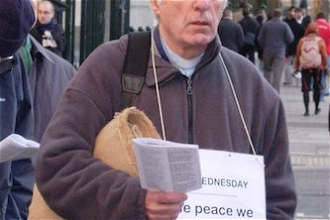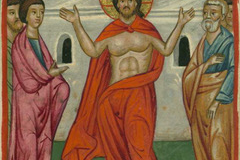Apostolic letter on the Holy Rosary
On Wednesday Pope John Paul II dedicated the next twelve months as the 'Year of the Rosary', and announced the introduction of the new Luminous Decades of the Rosary. On Saturday the new decades were prayed for the first time around the world. We publish below, extracts from Pope John Paul II's Apostolic letter on the Rosary. INTRODUCTION 'Numerous predecessors of mine attributed great importance to the Rosary of the Virgin Mary. Worthy of special note in this regard is Pope Leo XIII who on September 1, 1883 promulgated the Encyclical 'Supremi Apostolatus Officio', a document of great worth, the first of his many statements about this prayer, in which he proposed the Rosary as an effective spiritual weapon against the evils afflicting society. ... I myself have often encouraged the frequent recitation of the Rosary. From my youthful years this prayer has held an important place in my spiritual life. ... The Rosary has accompanied me in moments of joy and in moments of difficulty.' 'In continuity with my reflection in the Apostolic Letter 'Novo Millennio Ineunte', in which, after the experience of the Jubilee, I invited the people of God to 'start afresh from Christ', I have felt drawn to offer a reflection on the Rosary, as a kind of Marian complement to that Letter and an exhortation to contemplate the face of Christ in union with and at the school of his Most Holy Mother. To recite the Rosary is nothing other than to contemplate with Mary the face of Christ. As a way of highlighting this invitation, prompted by the forthcoming 120th anniversary of the aforementioned Encyclical of Leo XIII, I desire that during the course of this year the Rosary should be especially emphasized and promoted in the various Christian communities. I therefore proclaim the year from October 2002 to October 2003 the Year of the Rosary.' 'The most important reason for strongly encouraging the practice of the Rosary is that it represents a most effective means of fostering among the faithful that commitment to the contemplation of the Christian mystery.' 'A number of historical circumstances also make a revival of the Rosary quite timely. First of all, the need to implore from God the gift of peace. The Rosary has many times been proposed by my predecessors and myself as a prayer for peace. ... Consequently, one cannot recite the Rosary without feeling caught up in a clear commitment to advancing peace, especially in the land of Jesus, still so sorely afflicted and so close to the heart of every Christian. A similar need for commitment and prayer arises in relation to another critical contemporary issue: the family, the primary cell of society, increasingly menaced by forces of disintegration on both the ideological and practical planes, so as to make us fear for the future of this fundamental and indispensable institution and, with it, for the future of society as a whole.' I. CONTEMPLATING CHRIST WITH MARY. 'Mary constantly sets before the faithful the 'mysteries' of her Son, with the desire that the contemplation of those mysteries will release all their saving power. ... The Rosary, precisely because it starts with Mary's own experience, is an exquisitely contemplative prayer.' 'The Rosary is both mediation and supplication. Insistent prayer to the Mother of God is based on confidence that her maternal intercession can obtain all things from the heart of her Son.' 'The history of the Rosary shows how this prayer was used in particular by the Dominicans at a difficult time for the Church due to the spread of heresy. Today we are facing new challenges. Why should we not once more have recourse to the Rosary, with the same faith as those who have gone before us? The Rosary retains all its power and continues to be a valuable pastoral resource for every good evangelizer.' II. MYSTERIES OF CHRIST, MYSTERIES OF HIS MOTHER. 'Of the many mysteries of Christ's life, only a few are indicated by the Rosary in the form that has become generally established with the seal of the Church's approval. The selection was determined by the origin of the prayer, which was based on the number 150, the number of the Psalms in the Psalter. I believe, however, that to bring out fully the Christological depth of the Rosary it would be suitable to make an addition to the traditional pattern which, while left to the freedom of individuals and communities, could broaden it to include the mysteries of Christ's public ministry between his Baptism and his Passion.' 'Consequently, for the Rosary to become more fully a 'compendium of the Gospel', it is fitting to add, following reflection on the Incarnation and the hidden life of Christ (the joyful mysteries) and before focusing on the sufferings of his Passion (the sorrowful mysteries) and the triumph of his Resurrection (the glorious mysteries), a meditation on certain particularly significant moments in his public ministry (the mysteries of light). ... In proposing to the Christian community five significant moments ? 'luminous' mysteries ? during this phase of Christ's life, I think that the following can be fittingly singled out: (1) his Baptism in the Jordan, (2) his self-manifestation at the wedding of Cana, (3) his proclamation of the Kingdom of God, with his call to conversion, (4) his Transfiguration, and finally, (5) his institution of the Eucharist, as the sacramental expression of the Paschal Mystery. Each of these mysteries is a revelation of the Kingdom now present in the very person of Jesus.' III. FOR ME, TO LIVE IS CHRIST. 'The Rosary is simply a method of contemplation. As a method, it serves as a means to an end and cannot become an end in itself. All the same, as the fruit of centuries of experience, this method should not be undervalued. In its favour one could cite the experience of countless Saints. This is not to say, however, that the method cannot be improved. Such is the intent of the addition of the new series of 'mysteria lucis'. ... These suggestions, while respecting the well-established structure of this prayer, are intended to help the faithful to understand it in the richness of its symbolism and in harmony with the demands of daily life. Otherwise there is a risk that the Rosary would not only fail to produce the intended spiritual effects, but even that the beads, with which it is usually said, could come to be regarded as some kind of amulet or magic object, thereby radically distorting their meaning and function.' 'The mysteries of the Rosary neither replace the Gospel nor exhaust its content. The Rosary, therefore, is no substitute for 'lectio divina', on the contrary, it presupposes and promotes it. Yet, even though the mysteries contemplated in the Rosary, even with the addition of the 'mysteria lucis', do no more than outline the fundamental elements of the life of Christ, they easily draw the mind to a more expansive reflection on the rest of the Gospel, especially when the Rosary is prayed in a setting of prolonged recollection.' 'The Rosary can be recited in full every day, and there are those who most laudably do so. In this way it fills with prayer the days of many a contemplative, or keeps company with the sick and the elderly who have abundant time at their disposal. ... According to current practice, Monday and Thursday are dedicated to the 'joyful mysteries', Tuesday and Friday to the 'sorrowful mysteries', and Wednesday, Saturday and Sunday to the 'glorious mysteries'. Where might the mysteries of light be inserted? If we consider that the 'glorious mysteries' are said on both Saturday and Sunday, and that Saturday has always had a special Marian flavour, the second weekly meditation on the 'joyful mysteries', mysteries in which Mary's presence is especially pronounced, could be moved to Saturday. Thursday would then be free for meditating on the 'mysteries of light'.' 'This indication is not intended to limit a rightful freedom in personal and community prayer, where account needs to be taken of spiritual and pastoral needs and of the occurrence of particular liturgical celebrations which might call for suitable adaptations. What is really important is that the Rosary should always be seen and experienced as a path of contemplation.' CONCLUSION. 'The grave challenges confronting the world at the start of this new Millennium lead us to think that only an intervention from on high, capable of guiding the hearts of those living in situations of conflict and those governing the destinies of nations, can give reason to hope for a brighter future. The Rosary is by its nature a prayer for peace, since it consists in the contemplation of Christ, the Prince of Peace, the one who is 'our peace'.' 'The Rosary is also, and always has been, a prayer of and for the family. ... We need to return to the practice of family prayer and prayer for families, continuing to use the Rosary. ... The family that prays together stays together. ... Many of the problems facing contemporary families, especially in economically developed societies, result from their increasing difficulty in communicating. Families seldom manage to come together, and the rare occasions when they do are often taken up with watching television." 'At times parents suffer acute disappointment at the failure of their children to resist the seductions of the drug culture, the lure of an unbridled hedonism, the temptation to violence, and the manifold expressions of meaninglessness and despair. To pray the Rosary for children, and even more, with children ... is admittedly not the solution to every problem, but it is a spiritual aid which should not be underestimated.' 'At the start of the twenty-fifth year of my Pontificate, I entrust this Apostolic Letter to the loving hands of the Virgin Mary, prostrating myself in spirit before her image in the splendid Shrine built for her by Blessed Bartolo Longo, apostle of the Rosary.' source: Vatican Information Service


















